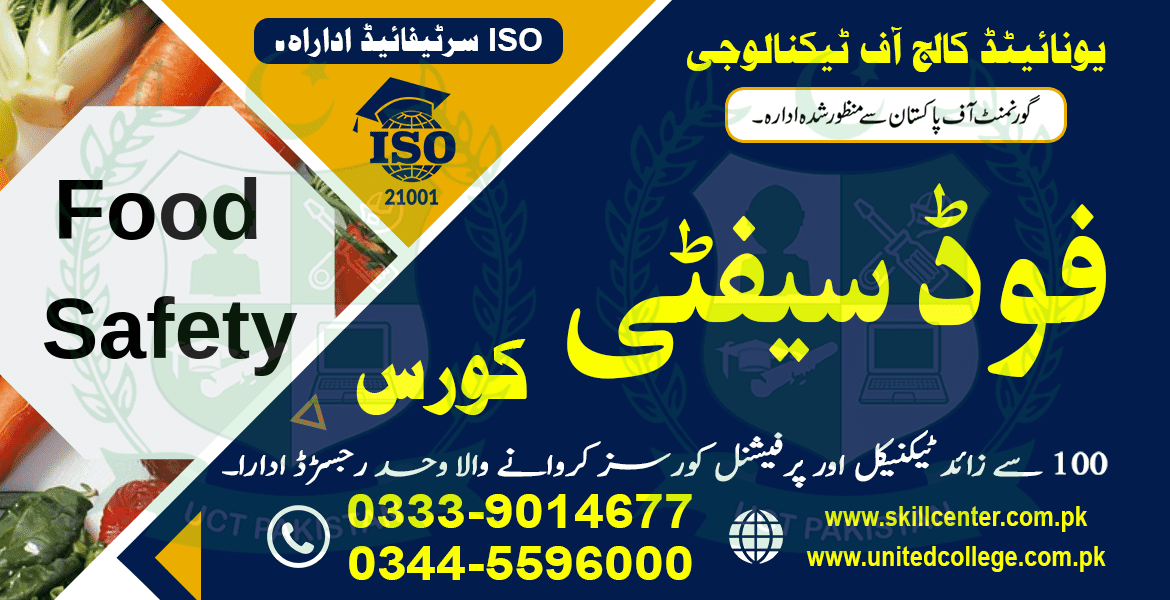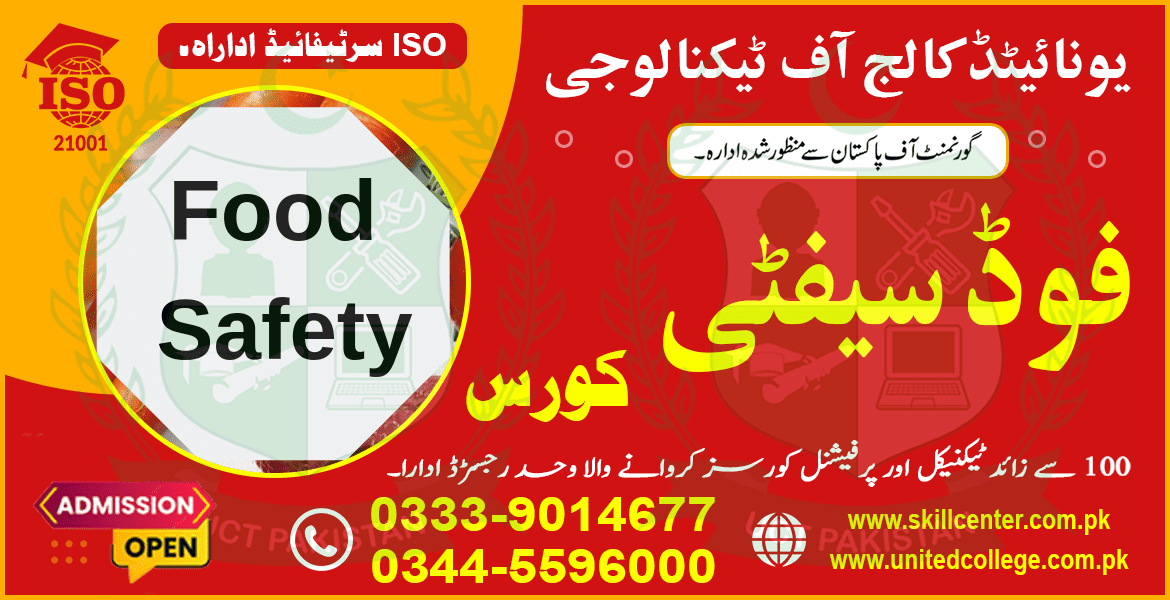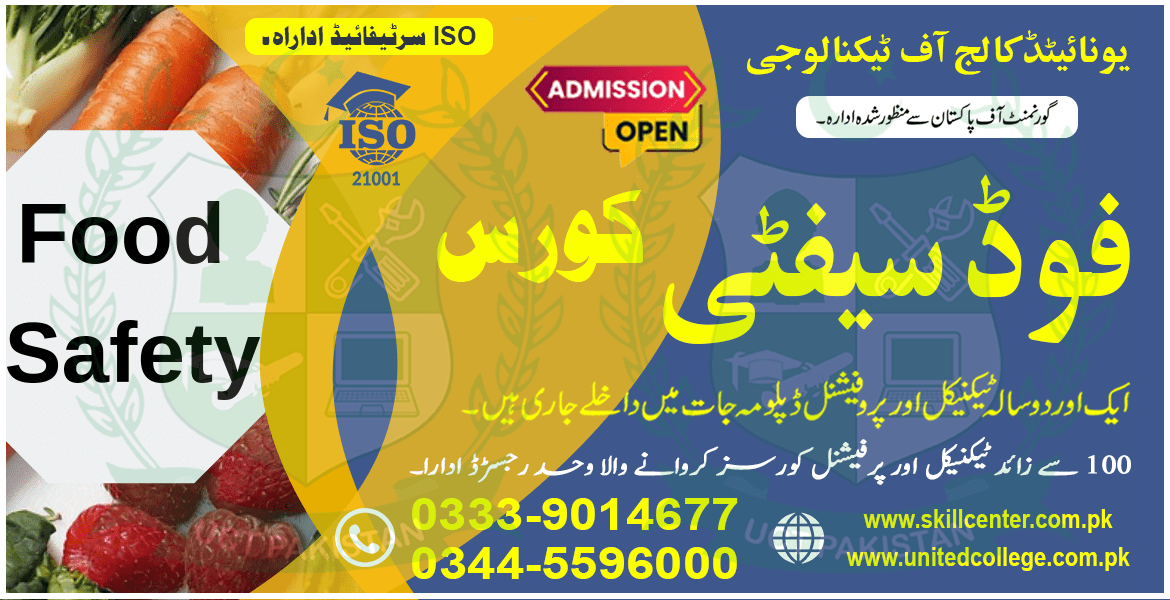Food Safety Course in Rawalpindi Islamabad 0333-9014677






Introduction to Food Safety
A Food Safety course is designed to provide individuals with the knowledge and skills necessary to ensure the safety and quality of food in the workplace or at home. This course is suitable for individuals who work in the food industry, including restaurants, catering services, and food manufacturing, as well as for those who handle food in their homes or communities. The course covers a range of topics, including the causes of foodborne illness, the principles of food safety management systems, the importance of personal hygiene and sanitation, the control of food hazards, and the principles of HACCP (Hazard Analysis and Critical Control Points).
In addition to providing practical skills, a Food Safety course will also cover legal and ethical issues related to food safety, as well as the responsibilities of individuals in preventing foodborne illness. The course is typically delivered over one or two days and involves a mix of lectures, demonstrations, and hands-on practice sessions. Upon successful completion of the course, participants will receive a Food Safety certificate that is valid for a specified period. Overall, a Food Safety course provides participants with the knowledge and skills necessary to ensure that food is safe and of high quality, and can help to prevent foodborne illness and maintain public health.






Food Safety Training Course Outline
This is a sample syllabus for a course on food safety:
Course Objectives
- To provide participants with the knowledge and skills necessary to ensure the safety and quality of food
- To teach participants about the causes of foodborne illness and how to prevent it
- To provide participants with an understanding of the legal and ethical issues related to food safety, as well as the roles and responsibilities of individuals in preventing foodborne illness
Course Content
Introduction to Food Safety
- What is food safety?
- Foodborne illness’s causes and effects
- The importance of food safety in the workplace and at home
- Legal and ethical issues related to food safety
Food Safety Management Systems
- Principles of food safety management systems
- Hazard Analysis and Critical Control Points (HACCP) principles
- Implementing and maintaining a food safety management system
Personal Hygiene and Sanitation
- The importance of personal hygiene and sanitation
- Good personal hygiene practices for food handlers
- Sanitation practices for food handling areas and equipment
Control of Food Hazards
- Different food dangers (chemical, physical, biological)
- Principles of controlling food hazards
- Temperature control for food safety
Food Handling Practices
- Principles of safe food handling practices
- Receiving, storing, and preparing food
- Serving and disposing of food
Course Delivery
The course is typically delivered over one or two days and involves a mix of lectures, demonstrations, and hands-on practice sessions. Participants will be assessed through written and practical examinations, and upon successful completion of the course, they will receive a Food Safety certificate that is valid for a specified period. It is important to note that while a Food Safety course provides valuable knowledge and skills, it is not a substitute for professional food safety training and compliance with local food safety regulations. Participants should always seek appropriate professional assistance when necessary to ensure food safety in their workplaces or homes.









































Benefits of OSHA Course
Introduction to HACCP
The Hazard Analysis and Critical Control Points (HACCP) gadget is a globally identified method of meal protection that forestalls risks in manufacturing and dealing with. Skill Center Pakistan in Rawalpindi provides a complete HACCP schooling path designed for food industry experts, restaurant body of workers, and meals commercial enterprise proprietors. This course affords in-depth information on HACCP principles and practical implementation strategies to ensure food protection and compliance with international standards.
Understanding HACCP Principles
The HACCP device is built on seven essential principles that assist pick out, preventing, and controlling meal protection hazards. These concepts shape the muse of powerful mmealsafety management:
Conduct a Hazard Analysis
- Identify capability organic, chemical, and bodily hazards in food production.
- Assess the risks related to raw substances, and food ma management and processing.
Determine Critical Control Points (CCPs)
- Identify unique points in the manufacturing technique where hazards may be controlled or eliminated.
- Establish preventive measures to reduce dangers.
Establish Critical Limits
- Define suited limits for temperature, time, pH ranges, and different safety parameters.
- Ensure that meals remain secure in the course of storage, training, and cooking.
Implement Monitoring Procedures
- Develop a machine to continuously monitor CCPs and ensure compliance.
- Use equipment inclusive of temperature logs, visible inspections, and microbiological testing.
Develop Corrective Actions
- Create a plan to cope with deviations from important limits.
- Ensure that corrective actions restore food protection and prevent recurrence.
Verify the HACCP System
- Conduct audits and inspections to make certain HACCP implementation is powerful.
- Use validation strategies including sample testing and document opinions.
Establish Record-Keeping and Documentation
- Maintain particular facts of HACCP plans, monitoring sports, and corrective movements.
- Ensure compliance with countrywide and global food protection regulations.
Implementing HACCP in Food Businesses
Proper implementation of HACCP ideas is crucial for preserving food protection in eating placmealeals processing flora, catering services, and retail meal companies. This path presents sensible schooling on growing a customized HACCP plan for your business, identifying dangers in actual global scenarios, and organizing powerful management measures.
Benefits of HACCP Training
- Compliance with global meal protection requirements (ISO 22000, FDA, WHO recommendations)
- Reduction of foodborne infection dangers and infection
- Improved consumer belief enterprise popularity
- Enhanced performance in manufacturing and managing
- Legal protection by meeting regulatory food protection necessities
Who Should Enroll?
This HACCP training route is designed for:
- Food enterprise owners and bosses
- Restaurant and catering team of workers
- Food protection officials and nice control specialists
- Anyone concerned with production, processing, or distribution
The HACCP Principles and Implementation Course at Skill Center Pakistan in Rawalpindi is critical for ensuring safe food managing practices and maintaining excessive food high-quality standards. By mastering HACCP ideas, contributors can save food safety risks, comply with regulations, and enhance their professional prospects within the food industry. Join us these days and take the first step toward expert food protection certification!





































































Personal Hygiene for Food Handlers
Importance of Personal Hygiene
Personal hygiene is vital for food handlers to save you infection and make certain meals protection. Poor hygiene can reason foodborne illnesses, affecting each clients and corporations.
Proper Handwashing Techniques
Food handlers who want to clean their fingers often use of cleaning cleaning cleaning soap and warm water, especially:
- Before coping with meals
- After the use of the restroom
- After touching raw meals, rubbish, or cash
Clean and Appropriate Work Attire
Wearing smooth uniforms, aprons, and gloves allows hold hygiene requirements. Hair need to be included with a hairnet or cap, and jewellery want to be averted to save you contamination.
Nail and Skin Care
Food handlers need to preserve their nails quick, easy, and free from nail polish to save you micro organism buildup. Any cuts or wounds must be protected with a water-proof bandage and gloves.
Health and Illness Awareness
Anyone experiencing contamination signs and signs and symptoms and symptoms collectively with fever, diarrhea, or vomitingneedsd to keep away from managing food to prevent spreading infections. Employers want to have easy pointers for reporting ailments.
By following those hygiene practicesmealls handlers can make sure mealsstays safe, shielding each customer and the recognition of food organizations.
































Foodborne Illnesses and Prevention
Foodborne Illnesses and Prevention
What Are Foodborne Illnesses?
Foodborne ailments, moreover referred to as meal poisoning, upward thrust up at the esametime as inflamed food or drinks are consumed. These ailments may be because of micro ororganismsviruses, parasites, or chemical materials that input meals all through processing, handling, or garage.
Common Causes of Foodborne Illnesses
- Bacteria – Examples encompass Salmonella, E. Coli, and Listeria, that might growth in improperly saved or undercooked food.
- Viruses – Norovirus and Hepatitis A can spread tthroughinfected meals and terrible hygiene practices.
- Parasites – Giardia and Toxoplasma may be determined in infected water or raw meals.
- Chemical Contaminants – Pesticides, pollution, and heavy metals can enter meals via wrong management and storage.
Symptoms of Foodborne Illnesses
- Nausea and vomiting
- Diarrhea and dehydration
- Stomach cramps and fever
- Severe instances can cause prolonged-time period health issues or hospitalization.
How to Prevent Foodborne Illnesses?
- Practice Proper Hand Hygiene – Wash your ingers very well in advance rather than dealing with meals.
- Cook Food at Safe Temperatures – Ensure meat, chook, and seafood are cooked to advocated temperatures.
- Avoid Cross-Contamination – Use separate reducing forums for uncooked and cooked components.
- Store Food Correctly – Keep perishable devices refrigerated and discard expired meals.
- Use Safe Water and Ingredients – Source food from reliable carriers and make certain clean water is used for cooking.
Understanding foodborne illnesses and their prevention is essential for maintaining food protection necessities, in particular inside the food enterprise enterprise. By following the ones outstanding practices, food handlers can protect customers and have a take a look at protection rules.

































Food Storage and Preservation Techniques
Importance of Proper Food Storage
Effective meal storage is critical to saving you from infection spoilage, and foodborne illnesses. In the Food Safety Course using way of Skill Center Pakistan, people will examine key garage strategies to hold food pleasant and safe.
Temperature Control and Refrigeration
Maintaining the right temperature is crucial for food renovation. The route covers:
- Refrigeration (zero°C to five°C) to sluggish bacterial boom.
- Freezing (-18°C or beneath) to hold meals for prolonged durations.
- Hot Holding (Above sixty three°C) to maintain cooked meals safe for consumption.
Dry Storage Best Practices
For non-perishable devices, dry storage techniques ensure meals stay steady. Key practices include:
- Keeping storage regions easy, dry, and properly ventilated
- Storing food off the ground and away from partitions.
- Using airtight boxes to prevent pest infestation.
FIFO (First In, First Out) System
The FIFO approach ensures older stock is used first, reducing waste and preventing expired food from being served. Proper labeling and date marking assist in maintaining efficiency.
Packaging and Preservation Methods
The direction moreover explores cutting-edge food upkeep strategies on the side of:
- Vacuum sealing to prevent oxidation.
- Canning and pickling for prolonged-term storage.
- Use of herbal and synthetic preservatives to increase shelf lifestyles.
By mastering these storage and upkeep strategies, people can enhance food safety, lessen waste, and have a look at food protection rules.




































Cross-Contamination and Allergen Management
Understanding Cross-Contamination
Cross-infection is a major hassle in meal protection, taking area even as dangerous bacteria, viruses, or allergens are via coincidence transferred from one surface, utensil, or mmealitem to every other. In the Food Safety Course with the aid of Skill Center Pakistan, people will study practical techniques to prevent move-contamination. This includes the get coping with raw and cooked ingredients, powerful cleansing and sanitization of the machine, and using coloration-coded gear to lower risks.
Allergen Management Essentials
The course moreover locations a sturdy emphasis on Allergen Management, an essential problem of metal protection. Participants can be educated to perceive unusual food allergens, which incorporate nuts, dairy, and gluten, and recognize the importance of correct mmeallabeling. They may also discover ways to save you flow-contact, which occurs whilst allergens are transferred to allergen-free foods, posing critical fitness risks to clients.
Practical Applications and Compliance
Through arms-on schooling, attendees will gain the abilties needed to put into effect allergen management protocols in their places of work. This includes growing dedicated preparation regions, education personnel on allergen recognition, and ensuring compliance with nearby and global meals safety regulations. By studying these practices, participants may be prepared to offer extra secure eating reviews and protect customers with food allergies.
This module is essential for food handlers, cooks, and eating place managers, ensuring they can maintain excessive requirements of hygiene and safety in their operations.




























Punjab Food Authority (PFA) Regulations
Introduction to PFA Regulations
The Punjab Food Authority (PFA) is a regulatory framework responsible for ensuring meal protection and hygiene requirements across Punjab. To maintain those standards, the PFA has applied strict regulations requiring food handlers and businesses to comply with particular food safety protocols.
Mandatory Food Safety Training
In keeping with PFA policies, all meal handlers, together with cooks, kitchen personnel, and food enterprise operators, want to complete a certified Food Safety Course. This training is critical to ensure that people managing meals are informed approximately secure practices, reducing the threat of foodborne illnesses and infection.
Key Topics Covered in the Course
The PFA-authorized Food Safety Course covers vital regions which encompass:
- Understanding foodborne illnesses and their reasons.
- Proper storage and temperature management.
- Preventing flow-infection.
- Personal hygiene and sanitation practices.
- Compliance with nearby and international food protection necessities.
Certification Requirements
Food agencies should make certain their personnel is educated and certified by PFA-identified institutes, together with Skill Center Pakistan. The certification is obligatory and serves as evidence of compliance for the duration of PFA inspections.
Inspections and Penalties
The PFA conducts normal inspections of food agencies to make certain adherence to food protection policies. Non-compliant companies can also face fines, outcomes, or maybe closure. Proper education and certification help companies keep away from these outcomes and keep operational continuity.
Benefits of Compliance
By following PFA regulations and finishing the Food Safety Course, meal organizations can:
- Ensure the protection and well-being of clients.
- Build consideration and credibility with clients.
- Avoid prison troubles and penalties.
- Enhance the overall excellence in their offerings.
Adhering to PFA regulations isn’t always handiest a criminal requirement however also a step toward promoting public fitness and keeping excessive requirements in the food employer.















































Food Safety in Catering and Restaurants
Food protection is a pinnacle precedence in catering and eating place operations, ensuring that meals is prepared, stored, and served in a hygienic way to guard customers from foodborne ailments. Proper meals protection practices are important to keeping an first-rate commercial corporation and complying with health policies.
Key Practices for Food Safety
- Preventing Cross-Contamination: Use separate slicing forums, utensils, and garage regions for raw and cooked substances to keep away from the switch of risky microorganisms.
- Proper Food Storage: Store uncooked elements and cooked meals at suitable temperatures to save you spoilage and bacterial increase. Label and date all food objects for easy tracking.
- Personal Hygiene: Ensure all team of workers observe strict hygiene practices, alongside facet normal handwashing, sporting smooth uniforms, and retaining off handling food on the same time as sick.
- Cleaning and Sanitizing: Maintain a easy kitchen surroundings thru often sanitizing surfaces, tool, and utensils to eliminate infection risks.
- Pest Control: Implement measures to save your pests, at the side as rodents and bugs, from entering installs schooling, and storage regions.
Managing Food Hazards
Identify and deal with capability dangers, which consist of herbal (bacteria, viruses), chemical (cleaning dealers), and physical (foreign places gadgets) contaminants, to ensure food safety at every degree.
Temperature Control
Monitor and hold the right cooking, cooling, and reheating temperatures to kill unstable bacteria and prevent foodborne ailments.
HACCP Principles
Adopt Hazard Analysis and Critical Control Points (HACCP) to systematically discover, take a look at, and manage meal safety dangers in catering and restaurant operations.
Conclusion
By imposing those food protection practices, catering and restaurant groups can make certain the health and satisfaction in their clients at the same time as complying with regulatory requirements. Proper schooling and adherence to food protection protocols are crucial for achievement in the food industry.

































Inspection, Auditing, and Compliance
1. Food Safety Inspections
The direction gives in-depth education on accomplishing effective meal protection inspections. Participants will discover ways to identify potential hazards, determine hygiene practices, and make sure proper meals garage, dealing with, and practiced This module equips students with the competencies to assess food premises, systems, and processes to save contamination and make certain compliance with protection standards.
2. Food Safety Auditing
The auditing aspect is especially important in evaluating meal protection management systems. Students will learn how to carry out inner and external audits, assessment documentation, and verify compliance with mmealprotection protocols. The education covers key requirements which include HACCP, ISO 22000, and FDA rules, ensuring individuals can effectively reveal and improve memealafety practices within their companies.
3. Compliance with Food Safety Regulations
Compliance is an important factor of the course, emphasizing adherence to local and worldwide food protection legal guidelines. Participants will benefit from expertise in regulatory requirements, learn how to put together reliable inspections, and implement corrective movements to deal with non-compliance. This module ensures that groups hold felony requirements, guard public health, and avoid penalties.
By learning inspection, auditing, and compliance, members can be well-prepared to uphold the best food safety standards, ensuring the safety and delight of consumers.

























Certification and Career Opportunities in Food Safety
Certification
Upon a hit very last touch of the Food Safety Course at Skill Center Pakistan, participants receive a diagnosed certification. This credential validates their know-how in meal protection practices, such as the right meal coping infection prevention, and compliance with fitness guidelines. The certification is significantly mentioned in the meals organization, making it a treasured asset for career development.
Career Opportunities
Graduates of the Food Safety Course can discover quite some professional paths inside the food enterprise. Potential roles encompass:
- Food Safety Officer: Ensuring compliance with food protection necessities in eating places, resorts, and meal production devices.
- Quality Assurance Manager: Overseeing food best and protection techniques in production centers.
- Hygiene Supervisor: Maintaining cleanliness and hygiene necessities in food institutions.
- Food Safety Consultant: Providing professional recommendations to groups on improving food safety practices.
Additionally, the certification opens doors to possibilities in government regulatory our bodies and worldwide food safety businesses. With the developing emphasis on meals safety globally, certified specialists are in high demand, making sure a worthwhile and robust profession in this vital issue.























Fee Structure and Payment Plans
Course Fee:
The overall price for the Food Safety Course at Skill Center Pakistan is PKR 45,000. This charge covers all education substances, arms-on realistic sessions, and an identified certification upon completion.
Payment Options:
Skill Center Pakistan offers flexible payment plans to house participants:
- Full Payment: Pay the whole charge of PKR 45,000 prematurely at the time of registration.
- Installment Plan: Divide the rate into two smooth installments of PKR 30,000 every. The first installment is due at registration, and the second can be paid at some stage in the direction.
Discounts and Offers:
- Early Bird Discount: Avail a unique cut price for early registrations.
- Group Enrollment Discount: Discounts are available for corporations of 3 or more members.
For extra information on price plans or to inquire about reductions, contact Skill Center Pakistan immediately.
Course Duration: 3 MONTH
Total Fee: 45000/-

























Frequently Asked Questions (FAQ's)
1. What is the Food Safety Course?
The Food Safety Course is an educational application designed to train human beings about proper food coping, storage, and hygiene practices to save them from foodborne ailments and ensure compliance with meal protection requirements.
2. Who can sign up for this course?
This route is open to meal organization specialists, restaurant workforce, caterers, hospitality humans, and every person interested in learning about food safety practices.
3. What subjects are protected inside the direction?
The path covers quite a number topics, which consist of foodborne illnesses, infection prevention, proper food garage, non-public hygiene, cleansing and sanitization, and compliance with meals safety policies.
4. Is there any certification furnished after the direction?
Yes, individuals who efficiently complete the direction will acquire a diagnosed certification from Skill Center Pakistan, that could beautify their profession opportunities inside the meals employer.
5. How lengthy is the direction length?
The route length varies, however it usually stages from some days to more than one weeks, counting on the utility shape and agenda.
6. Are there any prerequisites to enroll in the direction?
No earlier qualifications are required. The route is suitable for beginners and skilled professionals alike.
7. What are the timings of the direction?
Skill Center Pakistan offers flexible timings, such as morning, midnight, and weekend batches, to house running experts.
8. Where is the path executed?
The path is executed at Skill Center Pakistan’s training facility in Rawalpindi-Islamabad, which presents an expert and conducive gaining knowledge of surroundings.
9. How can I join within the route?
You can enroll by using the usage of traveling Skill Center Pakistan’s net web page or contacting their office without delay for registration details and route schedules.
10. Why is mental protection training important?
Food safety training is critical to save you foodborne ailments, make sure purchaser protection, comply with regulations, and maintain a immoderate widespread of hygiene in meals-related groups.
For extra facts, experience free to reach out to Skill Center Pakistan!




























































































































































